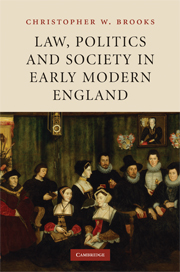Book contents
- Frontmatter
- Contents
- Preface
- Abbreviations and conventions
- 1 English history and the history of English law 1485–1642
- 2 Courts, lawyers and legal thought under the early Tudors
- 3 The initiatives of the crown and the break from Rome
- 4 Political realities and legal discourse in the later sixteenth century
- 5 The politics of jurisdiction I: the liberty of the subject and the ecclesiastical polity 1560 – c. 1610
- 6 The politics of jurisdiction II: multiple kingdoms and questions about royal authority
- 7 The absoluta potestas of a sovereign and the liberty of the subject: law and political controversy in the 1620s
- 8 The degeneration of civil society into a state of war 1629–1642
- 9 Law and ‘community’
- 10 The aristocracy, the gentry and the rule of law
- 11 Economic and tenurial relationships
- 12 The household and its members
- 13 The person, the community and the state
- 14 Conclusion
- Manuscript bibliography
- Index
- References
6 - The politics of jurisdiction II: multiple kingdoms and questions about royal authority
Published online by Cambridge University Press: 06 July 2010
- Frontmatter
- Contents
- Preface
- Abbreviations and conventions
- 1 English history and the history of English law 1485–1642
- 2 Courts, lawyers and legal thought under the early Tudors
- 3 The initiatives of the crown and the break from Rome
- 4 Political realities and legal discourse in the later sixteenth century
- 5 The politics of jurisdiction I: the liberty of the subject and the ecclesiastical polity 1560 – c. 1610
- 6 The politics of jurisdiction II: multiple kingdoms and questions about royal authority
- 7 The absoluta potestas of a sovereign and the liberty of the subject: law and political controversy in the 1620s
- 8 The degeneration of civil society into a state of war 1629–1642
- 9 Law and ‘community’
- 10 The aristocracy, the gentry and the rule of law
- 11 Economic and tenurial relationships
- 12 The household and its members
- 13 The person, the community and the state
- 14 Conclusion
- Manuscript bibliography
- Index
- References
Summary
Wales and Ireland
The clash between the common law and the ecclesiastical courts involved questions that had generated debate since before the Break from Rome in the 1530s. That they came to a head in the last decade or so of the reign of Elizabeth was due largely to the attempt by the ecclesiastical authorities to maintain the unity of the Church of England in the face of Protestantism's tendency to generate alternative visions of church government. The problem was that their methods involved invoking sources of authority, and using procedures, that were liable to attract the hostility of common lawyers. This quarrel about the relationship between the two ‘systems’ of law that coexisted within the realm would have been significant enough if it had taken place in isolation, but circumstances conspired in such a way that it did not. By the first decade of the seventeenth century, contemporaries also found themselves comparing English legal institutions with those in other parts of the British Isles, namely Wales, Ireland and Scotland. In the cases of Wales and Ireland, the underlying issues arose out of the medieval conquest and colonisation by the English of territories that had formerly been independent and enjoyed their own distinctive customary laws. Scotland, on the other hand, was an independent and historically hostile nation, whose king acceded peacefully to the throne of England in 1603 in the person of James VI and I.
Writing in the 1590s, the Pembrokeshire antiquarian George Owen explained that following the invasion of England by the Saxons, the ancient Britons had retreated to Wales where they managed to maintain their independence, and traditional laws, up to, and indeed after the Norman Conquest.
- Type
- Chapter
- Information
- Law, Politics and Society in Early Modern England , pp. 124 - 161Publisher: Cambridge University PressPrint publication year: 2009

